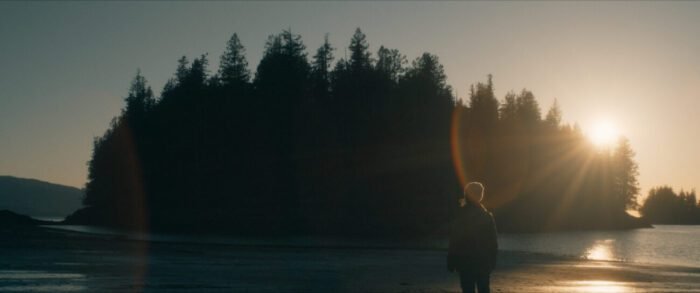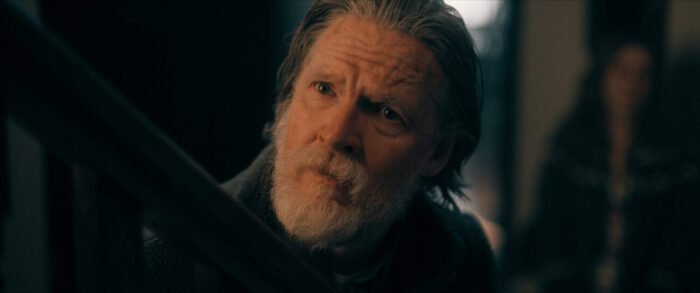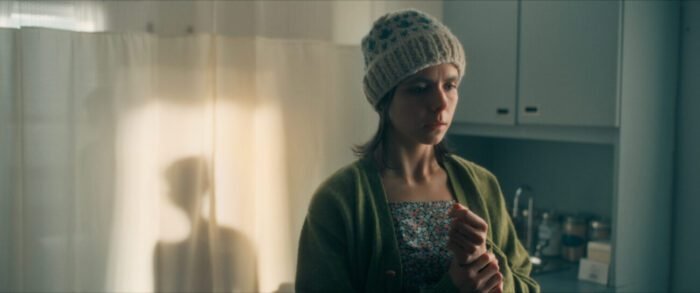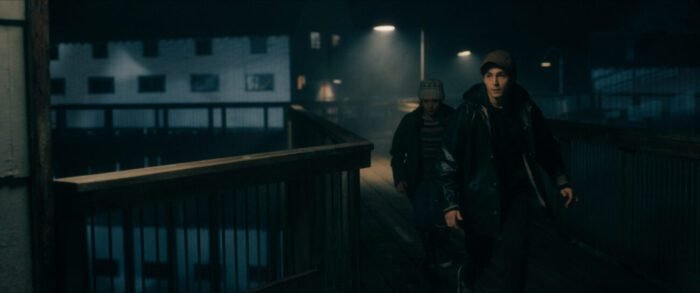There once was a little girl who heard an enchanting melody. Miles from town, nestled in a sea of trees in the Northernmost parts of British Columbia while camping with her family, she followed the melody to a serene island. The girl felt at home there as she walked around the enchanted place. She only stayed a few minutes before deciding to head back across the stone path that seemed to appear to her on the mainland, not knowing that days had passed outside of the island. When she came back across the path, she was changed somehow. Her body would continue to grow, but her mind would remain frozen in time. This is the fairy tale fantasy of The Island Between Tides.

I had heard many great things about The Island Between Tides, which went by the name The Lost Daughter as it travelled the festival circuit last year, and I hoped to find enjoyment when I would eventually see it, too. The film, written and directed by Austin Andrews and Andrew Holmes, is based on the 1920 play Mary Rose, by Peter Pan author James Matthew Barrie. I’m always interested to see the sparks of originality in reintroducing audiences to century-old ideas. Andrews and Holmes have been building their resumes for a while, working behind the camera for decades on various projects, and breaking out a little with The Island Between Tides, their sophomore feature together.
Introduced to what looks like a late fall day in Northern Canada, the audience witnesses a young Lily (Remy Marthaller) exploring the beach of a picturesque cove. With the wilderness backdrop, her parents pay her no mind as she surveys the shoreline for rocks, seashells, flowers, or whatever a little girl may be searching for in the sand. Her eyes light up when a stone path to a small island reveals itself to her as if by magic, and she hops across to continue her adventure on the adjacent shore. The cinematography is warm, though it appears cold in the shade, as the light cascades off the lens during the magic hour.
On the ridge above, her preoccupied parents and older sister have looked away for all but a second, and days have passed with innumerable search parties called. Lilly is presumed lost and possibly dead. Then, a miracle. Lily is seen on the shores where her parents last saw her, returned, seemingly unharmed, as if nothing ever happened. The nightmare is over, and Lily and her family can continue their lives, thankful to have their daughter back.

As the years pass, Lily (Riot Girls’ Paloma Kwiatkowski) grows up. Yet she retains her childlike inquisitiveness and, on occasion, needs complex subject matter broken down to help her understand. To everyone’s surprise, Lily has a son, Jared (Gotham’s David Mazouz), and as he develops, he has trouble communicating, too. Her sister, Zinnea (Shelby Oaks’ Camille Sullivan), revisits what happened to her as a child. The days she was missing on the island, and how Lily only recounted it as minutes. Lily believes the island calls for her and now her son as well, and wants to know more about it so she can help protect him from it. But after she leaves and returns this time, years have passed. Now, Jared’s in a bad way, and her family has been shattered from her having gone missing again.
There’s also one other mechanic, Jared and Lily, who both see people and events echoing through the fabric of time. These vespers of tragedy and violence haunt both mother and son, costing Jared his family through self-medicating and a string of volatile events.
To call the film “plot heavy” isn’t a stretch by any means, and, at ninety-nine-minute runtime, Andrews and Holmes do their best to balance audience engagement with Lily’s motivations. Paloma Kwiatkowski is superb, lovingly imbuing Lily with dignity and strength, though careful and protective of Lily’s innocence as she’s placed in all manner of psychological situations. In fact, the entire production has this very gentle air about it. Delicate in how the film tells Lily’s story, The Island Between Tides permeates with a genuinely touching serenity, informing the gravity of the film’s themes by supplying a mysticism to its drama. After the film finished, I decided to watch it again. This is a rare fantasy film that, while cemented in the mundane world as we know it, does a terrific job of captivating the audience with atmosphere and character development that they suspend belief and submit to the implausible.

Still, something during my first watch undermined a lot of what I liked about the film, and I couldn’t put my finger on it until I was halfway through my second watch. As I said, Andrews and Holmes do their best to provide balance, and this also applies to the exposition, much of which explodes at us in a torrent of quickly stitched together scenes bridging together the more engrossing parts of the film. However, elements necessary for deeper connections to the other characters are missed as the directors attempt to make the film tighter.
Sure, this is Lily’s story, but Andrews and Holmes show Lily’s mother (A Wounded Fawn’s Sarah Lind) and father (Resident Evil: Welcome to Raccoon City’s Donal Logue) reactions as she first goes missing, and later her father’s reactions to her return. Also, as Zinnia recalls Lily’s disappearance, we see moments in the sisters’ relationship that add foundational substance. This story has a lot to do with family, and that seems to get lost in the editing room as the overarching story takes precedence. What I’m getting at here is that there seem to be more, lengthier sequences that help define the familial connections and add depth to this family’s turbulent journey, so that when Lily disappears and returns again, we understand their frustrations.
In one scene, after Lily returns home after visiting the island, we’re introduced to Zinnia’s husband (Matthew MacCaull) and son (Sebastian Cooper). Ollie’s decidedly standoffish when it comes to people saying they’re Lily in the wake of an imposter surfacing at one point during Lily’s absence. It’s a very understandable protective instinct, and though we get the minimal understanding of that, we don’t get to know Ollie as a character beyond his rude, almost villainous, attitude toward Lily. In that second viewing, I discovered that the movie needed to either cut a little more out or add some of that dramatic connective tissue back into The Island Between Tides. Oddly allegorical to this film, its cut stands on two shores between a much longer drama and the faster-paced film. This also translates to some ghost characters, who could have benefited from a bit more screen time.

The Island Between Tides is an interesting film. It’s beguiling, charming, and haunting at times, discussing themes of heaven and resurrection without ever seeming preachy or daunting, and intimating such concepts may exist in spaces we cannot see. Some scenes become dark and foreboding within the film, offering momentary suspense. Still, these ghostly portions engage mind-opening ideas considered in Midnight Special and Spaghetti Junction about a universe existing in dimensional space lying on top of our own, too. Jared and Lily also serve as unique individuals who can see into that world, connecting aspects of science, the supernatural, and topics of faith, insisting that a lack of evidence isn’t proof of anything, asserting science as being indistinguishable from magic, and that there’s plenty of that magic left to discover in the world.
Overall, The Island Between Tides is an engaging and beautifully imagined ride that features a brilliant cast and two directors with some great instincts. That being said, the film is rough around the edges. However, after a couple of watches, and seeing the intricately woven story come to life by identifying all of the little puzzle piece connections that fit together, there is a remarkable softness in all of this grief. Should you believe in some divine presence, heaven, or ghosts, I think you’ll really love the imagination of The Island Between Tides, and even if you think it’s all bogus, there is still a robust philosophical conversation to be had concerning the science and the subtext.
James Matthew Barrie’s Peter Pan was about children who never grew up, an allegorical heaven for children gone too soon, battling the devil in a place where time didn’t exist. The Island Between Tides is the Return to Neverland story, and it’s just as captivatingly thought-provoking to see it from a different angle. The movie has a couple of issues, but it’s still a beautifully realized film that leaves you with hope and a smile, which is more than most movies leave you with.
The Island Between Tides is currently playing in Ottawa and Toronto theaters. US audiences can see the film under its US title, The Lost Daughter, via PVOD.




